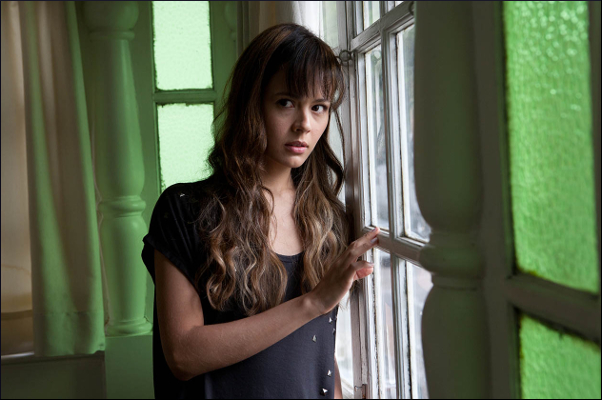La cara oculta (literally, “The Hidden Face,” although it was released in the US as Bunker) is one of those thrillers so dependent on a single plot twist – on a distinctive plot element that comes late in the film as a surprise – that to talk about it without spoiling it is futile. (What follows is a spoiler-free synopsis, in the first paragraph, and then a discussion of the plot in its entirety. Those who have not seen the film can go straight to the final two paragraphs.) At the start, we’re introduced to Adrián (Quim Gutiérrez), an orchestra conductor in Bogotá, Colombia, who has just been abandoned by his girlfriend (Clara Lago). An uncertain amount of time later, he’s drinking down his sorrow at a bar, where he hooks up with an attractive waitress, Fabiana (Martina García). They start a passionate romance together, yet every time that Fabiana is alone in Adrián’s house, she feels the presence of someone else, watching her.
"La cara oculta one of those thrillers so dependent on a single plot twist, that to talk about it without spoiling it is futile."
This is familiar territory for a ghost story, and indeed, the opening of the movie, which is a red herring concealing the real plot, is the least interesting site. We’re led to believe that Adrián is some kind of Bluebeard figure, who has killed his old girlfriend and plans to do the same with his new one. This set up is maintained until around the 45-minute mark, when a long flashback reveals what actually happened (spoilers ahead). The owner of Adrián’s house is the widow of a former Nazi officer, who hid away in Colombia like many Nazis did all over South America. He designed a secret room inside his house, where he could hide in case anyone came looking for him. Adrián and his former girlfriend, Belén, come to live together in this house, unaware of the room. When he has an affair and she cannot overcome her jealousy, the German widow provides Belén with an idea: hide herself in the secret room and pretend she’s leaving Adrián, to see how he reacts. She does so, but forgets to take the key with her, which remains under the couple’s bed. Thus, she effectively traps herself in the room without a chance of getting out, eventually forced to witness her worst nightmare: Adrián with another woman, whom she can see through a one-way glass.

It’s an attractive set-up for anyone who was brought up on a healthy dose of Tales from the Crypt or even Alfred Hitchcock Presents. But it’s also a story that requires a number of plot contrivances to work, and Colombian director Andrés Baiz does not do a very good job of selling the audience on some of these contrivances. The first of these is the sudden death of the German widow, who could have easily solved the predicament. The second is that, when Belén disappears, Adrián calls the police. Why he does so is unclear to me, since she leaves a video explaining to him why she left. Also, the police immediately suspect him of murder, even though he was the one who contacted them and even though he shows them her video. Yet another wrinkle is that one of the cops – as generic as movie cops can get – is Fabiana’s ex-boyfriend, who takes a personal interest in protecting her. There’s also the matter of exactly how long Belén could survive in her self-inflicted captivity, though the film addresses this issue by showing us that there’s canned food and a kitchen sink with dirty pipes inside her hidden room. To be fair, however, had the movie engaged us with better characters and actors – Martina García is beautiful, but she has only one facial expression and she has to use it too often – many of these questions could have been ignored.
"It’s the most blatantly manipulative thriller I have seen in some time, but there is no denying the wicked fun of its premise."
This is the second film by Baiz. His previous feature is definitely not recommendable: Satan, based on the real-life case of a Bogotá killing spree that took place in a restaurant called Pozzetto, in 1986. I am more inclined to give La cara oculta a pass, however. It’s the most blatantly manipulative thriller I have seen in some time, but there is no denying the wicked fun of its premise. The acting is less than stellar, but if you’re watching this late at night on television, you’re sure to have fun regardless. It lasts exactly as long as it needs to, so that there’s no time to dwell on the numerous plot holes and contrivances, since everything happens so fast.
La cara oculta is a Colombian-Spanish coproduction, distributed by 20th Century Fox, the first Colombian feature to ever engage a Hollywood studio. As often happens with such coproductions, the cast is split between two countries, with Gutiérrez and Lago representing Spain and the lovely, sexy García as the Colombian, forever coming in and out of the shower wrapped in a towel. Almost every other actor is Colombian, since the premise indicates that Adrián and Belén travel from Barcelona to Bogotá because of his work with the orchestra. However, other than the unavoidable Colombian accent, local slang is kept to a minimum, most likely because of the joint international distribution deal. There are also some beautiful night shots of Bogotá, and overall, the movie has some quality production values. Between this and Satan, there is no denying that Baiz is a competent director. He probably just needs a more personal screenplay.





